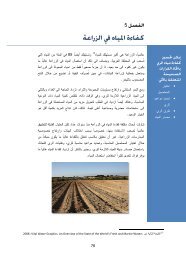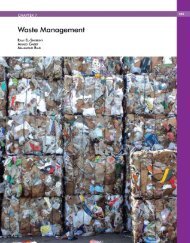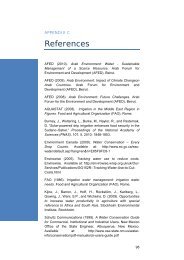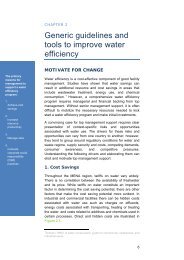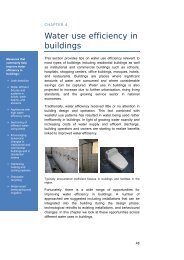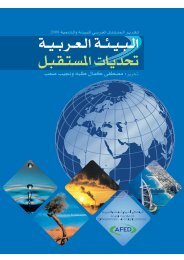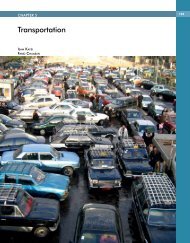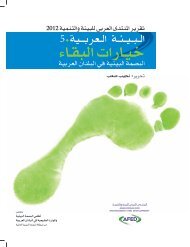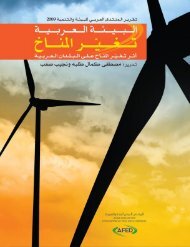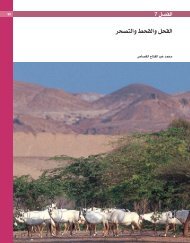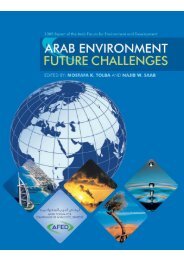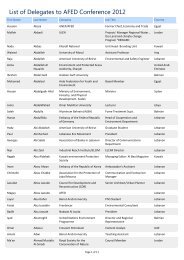Impact of Climate Change on Arab Countries - (IPCC) - Working ...
Impact of Climate Change on Arab Countries - (IPCC) - Working ...
Impact of Climate Change on Arab Countries - (IPCC) - Working ...
Create successful ePaper yourself
Turn your PDF publications into a flip-book with our unique Google optimized e-Paper software.
144<br />
CHAPTER 12<br />
INTERRELATION BETWEEN CLIMATE CHANGE AND TRADE NEGOTIATIONS<br />
I. INTRODUCTION<br />
It is now generally accepted that climate change<br />
is the result <str<strong>on</strong>g>of</str<strong>on</strong>g> increasing c<strong>on</strong>centrati<strong>on</strong>s <str<strong>on</strong>g>of</str<strong>on</strong>g> carb<strong>on</strong><br />
dioxide, methane, nitrous oxide and other<br />
greenhouse gases (GHGs) in the atmosphere<br />
(<strong>IPCC</strong>, 2007). <strong>Arab</strong> countries collectively c<strong>on</strong>tribute<br />
less than 5% <str<strong>on</strong>g>of</str<strong>on</strong>g> the total world emissi<strong>on</strong>s<br />
<str<strong>on</strong>g>of</str<strong>on</strong>g> GHGs. i The Middle East and North Africa<br />
(MENA) regi<strong>on</strong> is the world’s largest oil producing<br />
regi<strong>on</strong>, and oil, al<strong>on</strong>g with other fossil fuels<br />
gas and coal, is the largest GHG emitter.<br />
According to the Internati<strong>on</strong>al Energy<br />
Associati<strong>on</strong> (IEA), the world’s energy needs stand<br />
to increase by over 45% above present needs by<br />
2030, indicating an annual increase <str<strong>on</strong>g>of</str<strong>on</strong>g> approximately<br />
6%. Carb<strong>on</strong>-intensive fossil fuels will<br />
c<strong>on</strong>tinue to dominate the energy sector with oil<br />
remaining the primary energy source if business<br />
as usual is the prevailing scenario (IEA, 2007).<br />
In December 2009, envir<strong>on</strong>ment ministers and<br />
<str<strong>on</strong>g>of</str<strong>on</strong>g>ficials from 192 countries will meet in<br />
Copenhagen to attempt to negotiate a new internati<strong>on</strong>al<br />
regime to battle the urgent threat <str<strong>on</strong>g>of</str<strong>on</strong>g> climate<br />
change. The existing framework, the Kyoto<br />
Protocol, has not yet succeeded in realizing the<br />
reducti<strong>on</strong>s commitments made by its Parties, and<br />
calls for incorporating climate change initiatives<br />
into the internati<strong>on</strong>al trade framework have<br />
grown louder. While Kyoto has not been an<br />
overall success, it does provide Parties with<br />
enough flexibility to choose policy instruments<br />
to meet their commitments. Most importantly,<br />
Kyoto establishes positive measures to achieve its<br />
goals, namely technology transfer through the<br />
clean development mechanism (CDM), financial<br />
and technical assistance through joint implementati<strong>on</strong><br />
(JI), capacity building, and market based<br />
incentives, such as emissi<strong>on</strong>s trading.<br />
Given the limits <str<strong>on</strong>g>of</str<strong>on</strong>g> the internati<strong>on</strong>al trade regime<br />
which is not mandated to establish positive measures,<br />
a balanced multilateral envir<strong>on</strong>mental<br />
agreement (MEA) with its own tools and with its<br />
own dispute settlement mechanism for enforcement,<br />
taking guidance from the WTO framework,<br />
may be the ideal forum in which to navigate<br />
the climate change crisis. This chapter<br />
asserts that it is not solely through punitive regulatory<br />
mandates that climate change should be<br />
addressed, but also and inevitably through a<br />
combinati<strong>on</strong> <str<strong>on</strong>g>of</str<strong>on</strong>g> technology transfer and partnerships<br />
between industrial, oil-producing and other<br />
developing countries. Only a multilateral<br />
approach to climate change, outside the WTO,<br />
wielding both carrots and sticks, will allow these<br />
issues to be properly addressed.<br />
II. POST-KYOTO PROTOCOL<br />
AND WTO RULES<br />
The Kyoto Protocol has drawn <strong>on</strong> the United<br />
Nati<strong>on</strong>s Framework C<strong>on</strong>venti<strong>on</strong> <strong>on</strong> <str<strong>on</strong>g>Climate</str<strong>on</strong>g><br />
<str<strong>on</strong>g>Change</str<strong>on</strong>g> (UNFCCC) and Rio Principle 7 ii to<br />
build its foundati<strong>on</strong>s, clearly defining UNFCCC<br />
Annex I countries as developed countries that<br />
must carry the sole resp<strong>on</strong>sibility for climate<br />
change mitigati<strong>on</strong> during the first phase (2008-<br />
2012) <str<strong>on</strong>g>of</str<strong>on</strong>g> implementati<strong>on</strong>. As l<strong>on</strong>g as trade measures<br />
in the Protocol do not breach the relevant<br />
criteria <str<strong>on</strong>g>of</str<strong>on</strong>g> the WTO, fulfilling the necessity test,<br />
effectiveness and least trade restrictive requirements<br />
in additi<strong>on</strong> to the proporti<strong>on</strong>ality aspect, iii<br />
such measures will not be challenged by WTO<br />
members. Furthermore, reviewing WTO<br />
jurisprudence, such as the 1998 Shrimp-Turtle<br />
case, iv the organizati<strong>on</strong>’s flexibility to accommodate<br />
nati<strong>on</strong>al envir<strong>on</strong>mental protecti<strong>on</strong> policies<br />
becomes apparent, as well as the organizati<strong>on</strong>’s<br />
refusal to sancti<strong>on</strong> the impositi<strong>on</strong> <str<strong>on</strong>g>of</str<strong>on</strong>g> unilaterally<br />
c<strong>on</strong>ceived measures extra-territorially. In the<br />
implementati<strong>on</strong> <str<strong>on</strong>g>of</str<strong>on</strong>g> Kyoto, compatibility has been<br />
achieved with the rules and disciplines <str<strong>on</strong>g>of</str<strong>on</strong>g> the<br />
internati<strong>on</strong>al trade regime, and a balance<br />
between its disciplines and those set out in Kyoto<br />
has been and should c<strong>on</strong>tinue to be successfully<br />
cultivated. Any post-Kyoto agreement should<br />
aim for a similar design. It is important to<br />
emphasize that such a balance will at no rate<br />
inevitably compromise climate change mitigati<strong>on</strong><br />
measures.<br />
Although the relati<strong>on</strong>ship between Multilateral<br />
Envir<strong>on</strong>mental Agreements (MEAs) and the<br />
WTO as such has been relegated to the margins<br />
<str<strong>on</strong>g>of</str<strong>on</strong>g> the negotiating agenda <str<strong>on</strong>g>of</str<strong>on</strong>g> the Doha development<br />
round, prop<strong>on</strong>ents <str<strong>on</strong>g>of</str<strong>on</strong>g> negative measures to<br />
combat climate change c<strong>on</strong>tinue to press for the<br />
creati<strong>on</strong> <str<strong>on</strong>g>of</str<strong>on</strong>g> specific WTO rules to accommodate<br />
the envir<strong>on</strong>ment. For the <strong>Arab</strong> world, this push<br />
becomes particularly dangerous when energy,<br />
which has largely been a marginal issue in the<br />
WTO, comes under scrutiny directly through<br />
the occasi<strong>on</strong>al promoti<strong>on</strong> by some <str<strong>on</strong>g>of</str<strong>on</strong>g> an interna-



